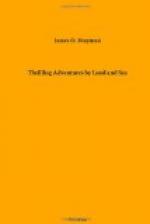With the first light of morning, the war-party sprang to their feet, and hastily despatching a slight repast, they set out on their journey with renewed animation and increased rapidity. Before starting, the chief called to Mary, and again offered some food; but no reply being returned, or motion discovered under the robe which he imagined enveloped her, he supposed she was sleeping, and directed the party to select the most even route when they emerged in the prairie, that she might as much as possible enjoy her repose.
The Indian who had planned and executed the escape of Mary, with the well-devised cunning for which the race is proverbial, had told his companions that he would rise before day and pursue the same direction in advance of them, and endeavor to kill a deer for their next night’s meal. Thus his absence created no suspicion, and the party continued their precipitate retreat.
But, about noon, after casting many glances back at the supposed form of the captive reclining peacefully in the snow-canoe, the chief, with much excitement, betrayed by his looks, which seemed to be mingled with an apprehension that she was dead, abruptly ordered the party to halt. He sprang to the canoe, and convulsively tearing away the skins, discovered only the roll of snow! He at first compressed his lips in momentary rage, and then burst into a fit of irrepressible laughter. But the rest raved and stamped, and uttered direful imprecations and threats of vengeance. Immediately they were aware of the treachery of the absent Indian, and resolved with one voice that his blood should be an atonement for the act.




